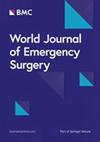术前血清胆碱酯酶水平降低和粪便腹膜污染是继发性腹膜炎源头控制后肠缝合线渗漏的潜在预测因素
IF 5.8
1区 医学
Q1 EMERGENCY MEDICINE
引用次数: 0
摘要
在治疗继发性腹膜炎的急诊开腹手术中,造口置入率很高,这是目前快速手术环境下需要改变的一种模式。尽管有越来越多的证据表明在腹膜炎环境下进行原发性肠道重建是可行的,但很少有数据能证明外科医生在造口和吻合之间的选择。这项回顾性分析旨在确定术前和术中参数,以预测在治疗继发性腹膜炎的源头控制手术(SCS)中放置肠缝合线的渗漏风险。2014年1月至2020年12月期间,497名患者因继发性腹膜炎接受了SCS手术,其中187人接受了无分流造口的下消化道初级重建。有 47 例(25.1%)患者在翻修手术中或通过计算机断层扫描直接确认了术后肠缝线渗漏。通过多变量分析发现了可量化的肠道缝合结果预测因素。与吻合完好的患者相比,SCS术后肠道缝合线渗漏患者的重症监护时间、院内死亡率和无法返回初始家庭环境的比例明显更高(分别为p < 0.0001、p = 0.0026和p =0.0009)。血清胆碱酯酶(sCHE)水平降低和腹膜炎程度较高被认为是急诊开腹手术中肠缝合不全的独立风险因素。术前 sCHE < 4.5 kU/L 和全身性粪便腹膜炎与腹膜炎腹腔内下消化道初次重建后肠缝合不全的发生率明显较高有关。这些参数可指导外科医生在紧急情况下选择最佳手术方法。本文章由计算机程序翻译,如有差异,请以英文原文为准。
Reduced preoperative serum choline esterase levels and fecal peritoneal contamination as potential predictors for the leakage of intestinal sutures after source control in secondary peritonitis
The high rate of stoma placement during emergency laparotomy for secondary peritonitis is a paradigm in need of change in the current fast-track surgical setting. Despite growing evidence for the feasibility of primary bowel reconstruction in a peritonitic environment, little data substantiate a surgeons’ choice between a stoma and an anastomosis. The aim of this retrospective analysis is to identify pre- and intraoperative parameters that predict the leakage risk for enteric sutures placed during source control surgery (SCS) for secondary peritonitis. Between January 2014 and December 2020, 497 patients underwent SCS for secondary peritonitis, of whom 187 received a primary reconstruction of the lower gastro-intestinal tract without a diverting stoma. In 47 (25.1%) patients postoperative leakage of the enteric sutures was directly confirmed during revision surgery or by computed tomography. Quantifiable predictors of intestinal suture outcome were detected by multivariate analysis. Length of intensive care, in-hospital mortality and failure of release to the initial home environment were significantly higher in patients with enteric suture leakage following SCS compared to patients with intact anastomoses (p < 0.0001, p = 0.0026 and p =0.0009, respectively). Reduced serum choline esterase (sCHE) levels and a high extent of peritonitis were identified as independent risk factors for insufficiency of enteric sutures placed during emergency laparotomy. A preoperative sCHE < 4.5 kU/L and generalized fecal peritonitis associate with a significantly higher incidence of enteric suture insufficiency after primary reconstruction of the lower gastro-intestinal tract in a peritonitic abdomen. These parameters may guide surgeons when choosing the optimal surgical procedure in the emergency setting.
求助全文
通过发布文献求助,成功后即可免费获取论文全文。
去求助
来源期刊

World Journal of Emergency Surgery
EMERGENCY MEDICINE-SURGERY
CiteScore
14.50
自引率
5.00%
发文量
60
审稿时长
10 weeks
期刊介绍:
The World Journal of Emergency Surgery is an open access, peer-reviewed journal covering all facets of clinical and basic research in traumatic and non-traumatic emergency surgery and related fields. Topics include emergency surgery, acute care surgery, trauma surgery, intensive care, trauma management, and resuscitation, among others.
 求助内容:
求助内容: 应助结果提醒方式:
应助结果提醒方式:


